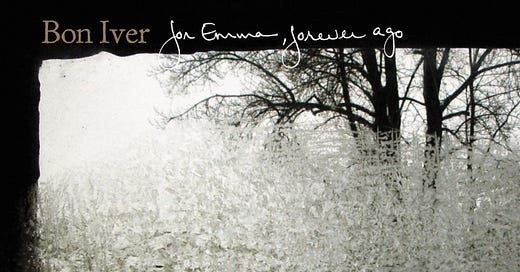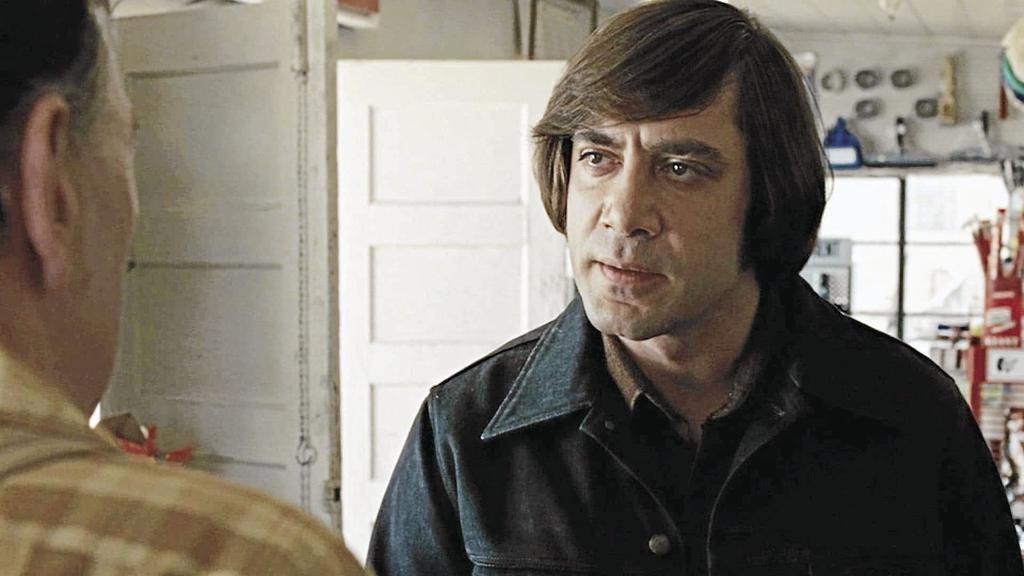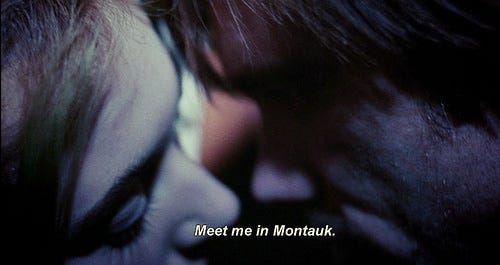Back in 2008, the very week that For Emma, Forever Ago was released in Europe with Uncut and Mojo handing out ten stars between them and declaring it as up there as a record of the year contender1 I was at Brighton’s The Great Escape Festival, watching Justin Vernon—aka Bon Iver—end his set with an un-amplified, room-stilling rendition of ‘Skinny Love’ standing in the middle of an enthralled crowd in the top room of a small pub. It is one of the gigs that I am most grateful that I was present for. The reverence among the audience was palpable, so quiet you could hear the faintest whispers at the back.
A few days later I was able to buy the record in stores and, for all the highs and lows Bon Iver goes through on the record it is the closing track, ‘Re: Stacks’, that cements the emotional core of the record, closing the album not just as an ending footnote but as an essential and necessary exhalation after an arduous journey.
‘Re: Stacks’ is a song that shows you the weariness and fragile hope clinging on to it, echoing the themes that permeate For Emma, Forever Ago. Its title alone—‘Re: Stacks’—hints at correspondence and introspection.
Vernon once explained,
It's 'Regarding.' People use it in letters and emails. It's about pointing towards and idea, to amplify that 'This song is about the stacks.' I mean, every song title does that in a way, but I just really wanted to point it out: this song isn't the stacks, it's about the stacks.
The ‘stacks’ probably refer to poker chips, representing the emotional stakes he has invested in love and life, and the resultant sense of loss when it all falls apart. There’s a sense of playing a game where the odds were always rigged, and the house—fate, love, life—has won. You have to put something of yourself on the line to stand to win anything, something that someone else in 2007/8 was also telling us.
Recorded in solitude during a now-legendary cabin retreat in Wisconsin, the production of For Emma, Forever Ago is defined by its stark honesty. Vernon’s vocals, layered but intimate, are laid over sparse, echoing guitar lines that feel both immediate and distant, almost dismembered. If they sound like they were recorded in the silence of snow-covered woods, it is because they probably were. ‘Re: Stacks’ maintains this aural atmosphere, but with a touch more vulnerability; Vernon’s voice is weary as it has been throughout the previous 30 mins but this time it gives you a hint of something else; Resilience, reflecting the emotional excavation he went through. You get drawn in as every note underscores the tension between despair and catharsis.
The lyrics paint fragmented images that coalesce into something universally relatable yet deeply personal. Vernon’s words reach into historical and metaphorical depths, such as his reference to “Qumran”—an archaeological site linked to the Dead Sea Scrolls and the only reference he had on his MySpace2 page at the time.
He once noted,
When they found them it changed the whole course of Christianity... I think I was just looking at it as a metaphor for whatever happens after that is new shit.
This parallel hints at a discovery that alters everything, much like how personal revelations reshape one’s sense of identity. Vernon’s decision to close the album with ‘Re: Stacks’ feels deliberate or the song selected itself for the job. It’s a lament—“love frozen in the ground,” as one might describe it—but it’s also about confronting that love, trying to unearth its significance amidst the pain.
This aligns with what Vernon said during a 2012 concert introduction:
This song is about potential loss and make-up gain.
The song is alive with metaphors that translate grief into tangible, even mundane, objects. A black crow, representing depression, holds the keys to Vernon’s freedom, teasing hope but refusing to release it. We explore the helpless, cyclical questioning that often comes with heartache. The metaphor of poker chips—pushing more onto the table and still losing—underscores the idea of loving relentlessly, even when it only leads to loss.
There are many people for whom the song continues to resonate beyond its initial release due to the universality of its themes: the recognition that love, once tainted by betrayal or heartbreak, becomes a burden. Yet, the song hints at moving forward, of taking those metaphorical keys back from the crow, a subtle nod towards healing. The final moments are not a triumphant slaying of the beast, but there’s a whisper of acceptance that is just as powerful.
I personally link the song’s role on the album to those last (chronological) scenes in Eternal Sunshine of the Spotless Mind where we have the suggestion that Joel and Clementine might rediscover each other. Love and memory blur, where people choose to forget but are inevitably drawn back to what was lost.
Vernon’s use of multi-tracked falsetto, the gentle rustle of his guitar, and the careful layering of production make ‘Re: Stacks’ distinctively Bon Iver. At that Brighton show, the version of ‘Skinny Love’ performed amongst the crowd was raw, stripped of the album’s production, and it reminded everyone present of the vulnerability that runs through all of Vernon’s work. For years, fans have dissected its lines, passed around stories of personal connection, and used its slow, steady rhythm as a balm for their own heartbreaks.
Like an excavation, each new listen reveals more layers, like Heraclitus said you can never stand in the same river, I say you can never listen to ‘Re: Stacks’ in quite the same way once you have a stack of chips worth calling.
Ultimately, both magazines would place it 4th. For Mojo, The Last Shadow Puppets, Paul Weller and Fleet Foxes would sit above it. For Uncut Portishead, Fleet Foxes and TV on The Radio sat above it.
Yes, you are old - this was almost twenty years ago now.






Placing this classic below Paul Weller and some Arctic Monkeys side project is the most Mojo move I’ve ever heard